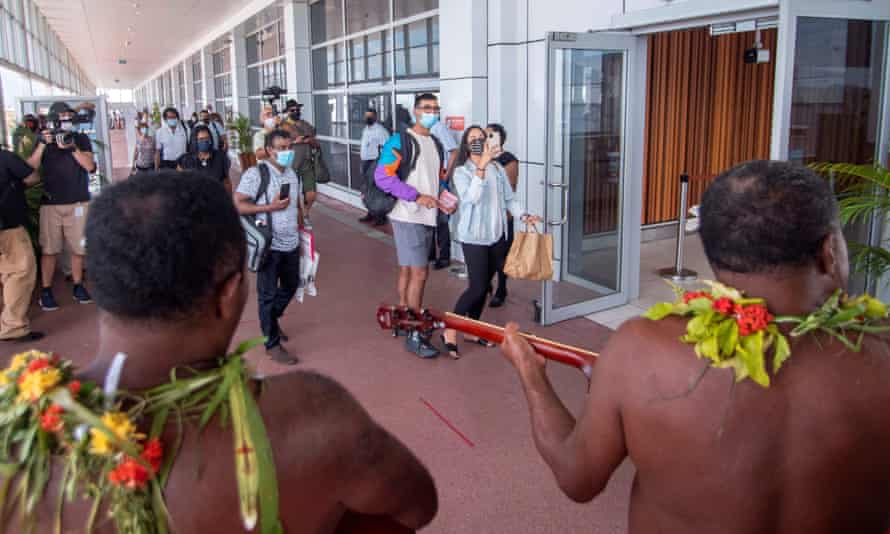
The World Health Organization has said those not fully vaccinated who are vulnerable to Covid-19, including over-60s, should delay travel to areas with community transmission, as more countries imposed curbs to combat the spread of the new Omicron variant.
The moves came as the WHO said “blanket bans” would not contain the strain of the virus which it previously warned presents a “very high” risk globally.
The United States will require stricter coronavirus testing at borders for all travellers, including returning Americans, amid Omicron variant concerns.
US officials will require everyone entering the country to be tested one day before boarding flights, regardless of their vaccination status or country of departure. Administration officials are also considering a requirement that all travellers get retested within three to five days of arrival. Currently those who are fully vaccinated may present a test taken within three days of boarding.
The move is part of an enhanced winter Covid strategy that the Biden administration plans to announce on Thursday.
From Wednesday, a vaccination will be required for travel in and out of Canada.
Japan said it would expand its travel ban on foreigners entering the nation to prevent those with resident status from 10 African nations from entering the country “for the time being”.
Singapore said on Wednesday that it will require mandatory PCR testing for all travellers and additional antigen rapid tests for travellers on vaccinated travel lanes.
All travellers entering or transiting through the city state after Thursday 2 December must undergo a pre-departure test within 2 days of their departure for Singapore and obtain a negative result. All travellers entering Singapore must undergo a Covid-19 PCR test on-arrival.
Hong Kong will expand its entry ban for non-residents to three more countries, Japan, Portugal and Sweden, from Friday, authorities said on Wednesday, while Indonesia added Hong Kong to its travel ban list alongside several African countries.
Scientists are racing to determine the level of threat Omicron poses to the world, a week since it was first detected in South Africa. Cases have since been found in countries across North America, Asia and Europe. Nigeria confirmed its first cases on Wednesday. While it is unclear what level of protection vaccines may provide, the WHO issued a warning against travel to potential Covid hotspots for unvaccinated, vulnerable people.
“Persons who have not been fully vaccinated or do not have proof of previous Sars-CoV-2 infection and are at increased risk of developing severe disease and dying, including people 60 years of age or older or those with comorbidities that present increased risk of severe Covid-19 … should be advised to postpone travel to areas with community transmission.”
The WHO also said blanket travel bans “will not prevent the international spread, and they place a heavy burden on lives and livelihoods”. It added bans can have other adverse affects include deterring countries from sharing epidemiological data.
WHO chief, Tedros Adhanom Ghebreyesus, said it was understandable for countries to seek to protect their citizens “against a variant we don’t yet fully understand”.
But he called for the global response to be “calm, coordinated and coherent”, urging nations to “take rational, proportional risk-reduction measures”.

The European Union’s medical agency chief said on Tuesday that it would take two weeks to have an indication whether the current Covid-19 vaccines would be able to deal with it.
The variant has emerged as much of the northern hemisphere was already bracing for a new winter wave of the pandemic – leaving even nations with high vaccination rates struggling to contain rising infection numbers and prevent health services from being overwhelmed.
Governments, particularly in western Europe, have already reintroduced mandatory mask-wearing, social-distancing measures, curfews or lockdowns – leaving businesses fearing another grim Christmas.
Greece went ahead Tuesday in making vaccines compulsory for over-60s, while Norway will offer booster shots to all adults before Easter, as preferable to a lockdown. Britain has set a target of delivering third jabs to all adults within two months.
But while curbs were returning to many parts of the world, the Pacific island of Fiji ended 615 days of international isolation on Wednesday and reopened to tourists.
Traditional dancers in grass skirts welcomed waving holidaymakers from Australia, the first of an expected flood of desperately needed tourists in the coming weeks.
Fiji Airways chief executive Andre Viljoen said it was a “momentous” occasion, where tourism accounts for about 40 percent of the economy.
“The international border reopening will reignite Fiji’s economy,” he told reporters.
With Agence-France Presse and Reuters


